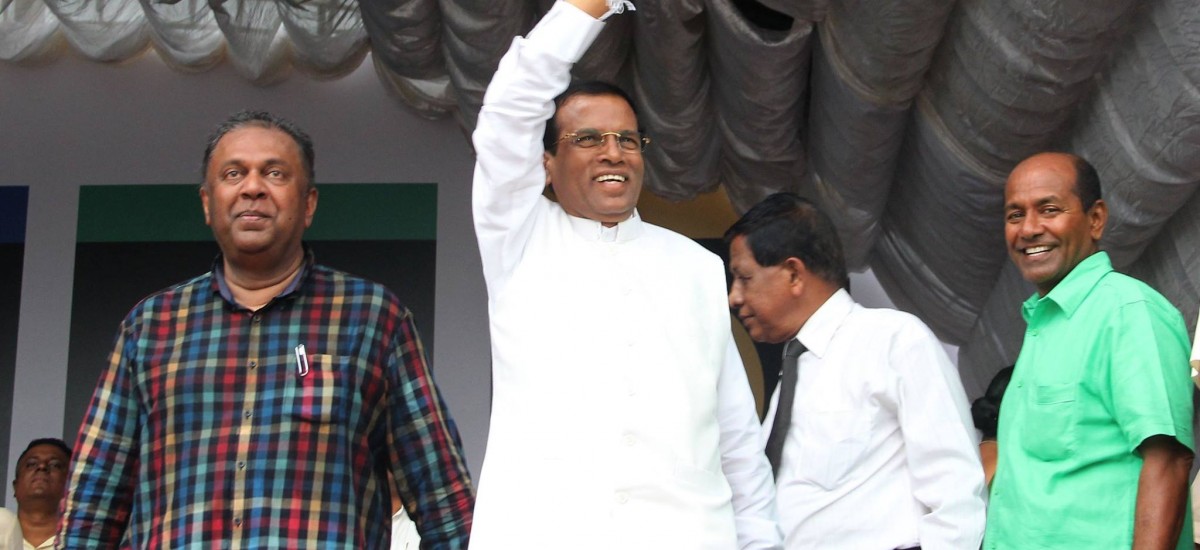Image via Maithripala.com
We extend our sincere congratulations to President Maithripala Sirisena. After a decade of the Rajapaksas, Sri Lankans have decided to make a change. And we’re happy that, in spite of Rajapaksa’s egregious abuse of state resources in the run-up to the vote, voting day was a relatively clean, fair affair.
Having said that, it is both unfortunate and unsurprising that Tamil issues were sidelined during the presidential campaign. We watched closely as Sirisena came out so clearly on matters pertaining to international war crimes prosecution and devolution. Undoubtedly, bringing the JHU on board was an added bonus as he sought to shore up his Sinhala-Buddhist credentials and further cut into Rajapaksa’s voter base.
During the campaign, both sides took the Tamil vote for granted.
Over the past ten years, Rajapaksa’s policies alienated the Tamil community. The former president knew he was unpopular in the North and East and barely made an effort during the campaign. On the other hand, Sirisena (correctly) recognized that, if Tamils were allowed to go to the polls, he’d carry the overwhelming majority of the Tamil (and Muslim) vote.
Encouragingly, misguided calls for a Tamil boycott were met with a robust turnout in historically Tamil areas. Now that the election is over, some have suggested that Sirisena will not concern himself with Tamil issues. After all, minority voters are (potentially) far more important in a presidential election than a parliamentary one. Will Sri Lanka’s numerical minorities be forgotten until the next presidential election?
Going forward, Sirisena will need to do more than just brand himself as the anti-Rajapaksa. When it comes to Tamil issues, it remains unclear how Sirisena would do things differently. Broadly speaking, the four crucial areas which are of immediate concern to Tamils include: transitional justice, a political solution, militarization and land issues. While we understand that sweeping changes will not happen overnight, here are a few places that a new administration could start:
- On a political solution – The government should clarify its position regarding international observation for future government-TNA talks. Mr. Sampanthan mentioned this last September, but it’s not clear where things stand. Even though crafting a reasonable power-sharing arrangement in the near-term looks increasingly unlikely, seeking international participation at the outset would be wise.
- On land issues – The issue of civilian land being occupied by military personnel needs to be addressed immediately. The government could begin by returning land in Keppapilavu, Pallimunai and Omanthai to civilians. Additionally, community members have told TSA that the military runs eight farms[1] across Kilinochchi, Vavuniya and Mullaitivu districts. These farms should be returned to their respective Pradeshiya Sabhas. If local government were allowed to take control of them, they’d provide needed income for the respective Pradeshiya Sabhas and employment for community members residing in these areas.
- On human rights – The government should release the approximately four-hundred political prisoners who are still detained under the Prevention of Terrorism Act (PTA). In addition, the government should establish a committee to review how the PTA could be repealed and why this remains such a serious issue for the Tamil community. While, we’d like to see the PTA repealed immediately, it’s (unfortunately) unrealistic to expect Sirisena to move quickly on an issue like this. In that context, let’s try to add a bit of nuance to the reform agenda in the near-term.
This was a close election and it’s clear that Rajapaksa remains popular amongst the Sinhala-Buddhist community. Civil society and the international community should pay close attention to Sirisena’s first few months in office and adjust accordingly.
Many commentators have already suggested that Sirisena’s win is not a real victory for democracy in Sri Lanka. That remains to be seen, but a perpetuation of majoritarian triumphalism will not go unnoticed.
Over the past few years, issues like accountability, reconciliation and a political solution have been fervently debated outside of Sri Lanka, yet discussion on the island has been rather weak.
Let’s change that.
Let’s bring the debate about post-war Sri Lanka – a united Sri Lanka – back home. And let’s not forget that talk, unaccompanied by action, is meaningless.
###
Follow The Social Architects (TSA) on Twitter @soc_arch.
[1] Kilinochchi (Santhapuram, Mudkomban, Theravil, Piaramanthanaru); Vavuniya (Kanagarayankulam); Mullaitivu (Udaiyarkaddu, Kaiveli, Thevipuram).

